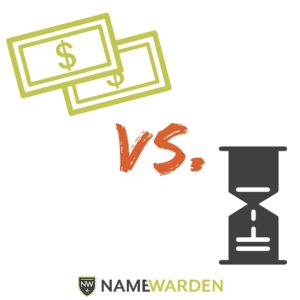Should IP Attorneys Use Flat Fee or Hourly Fee Billing?
The number of hours you bill per week is a common concern in the life of a lawyer – especially if you work in a law practice with other lawyers. It can be a pain to always watch the clock and tricky to estimate costs to clients. Billing by the hour and watching the clock is easy and safe for the lawyer, but causes clients a whole lot of heartburn. It is not the only way! For some attorneys (like Intellectual Property Attorneys), it can be easier on the client and the attorney to use a flat fee for legal services. If you’re on the fence about how to charge, here are some things to consider in the flat fee vs. hourly fee debate.
work in a law practice with other lawyers. It can be a pain to always watch the clock and tricky to estimate costs to clients. Billing by the hour and watching the clock is easy and safe for the lawyer, but causes clients a whole lot of heartburn. It is not the only way! For some attorneys (like Intellectual Property Attorneys), it can be easier on the client and the attorney to use a flat fee for legal services. If you’re on the fence about how to charge, here are some things to consider in the flat fee vs. hourly fee debate.
The Pros of Flat Fees
Charging flat fees has a lot of pros, and for IP Attorneys, it can make more sense than billing hourly rates.
For one, there’s a matter of tracking time. Who wants to constantly monitor their time for each and every task they perform? It makes the work seem robotic and it’s easy to make a mistake. Forget an email here and a phone call there… those .1 and .2 hours add up eventually.
Flat fees also force you to be more efficient – leaving more time to work on other projects and perhaps end up billing more than you would have.
Time is also not a great indicator of value. After your first hundred trademark registrations (or if you use NameWarden), the time it takes you is not equal to the value you are providing the client. It’s the same for other tasks like portfolio management or monitoring marks.
Let’s move past time and onto client perception. Let’s face it – no one wants to enter into an agreement with no idea of how much the work is going to cost. In your client’s eyes, they are purchasing services, not time. They do not actually care about renting your afternoon. They want you to answer a thorny question or drive a business result. Flat fee pricing makes it easy for a client to know what they are about to spend and it removes the barrier of worrying about time and the uncertainty of cost.
The Pros of Hourly Fees
Hourly fees are how many law firms base their compensation structure. Charging flat fees also means you need to change how you assess promotions, compensation, and bonuses.
In terms of trademark office actions, enforcement, and litigation, it may be hard to asses a flat fee for a process that could go on longer than expected. Can you really calculate all of the time spent meeting, emailing, calling, and researching before the case even happens?
Clients also tend to be more considerate of your time when they know they have to pay for every minute of it. That means less frequent emails, phone calls, and requests – all of which can be time consuming.
Which to choose
The beauty is that it doesn’t have to be one or the other. You can decide to charge flat fees for things like copyright, trademark, and patent registration and then bill hourly for office actions and adversarial matters. You can your clients which they prefer and figure out what makes the most sense for your practice.
One note: If you decide to go entirely flat fee based, spend the little bit of time it takes to get specific in the scope of each project. This will prevent you from losing your shirt on an indecisive client or a case that blows up.
